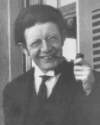 (source)
(source)
|
Jean Piaget
(9 Aug 1896 - 17 Sep 1980)
Swiss psychologist and zoologist who spent his distinguished career researching the stages of mental growth from infancy to adulthood.
|
Science Quotes by Jean Piaget (7 quotes)
Chance … in the accommodation peculiar to sensorimotor intelligence, plays the same role as in scientific discovery. It is only useful to the genius and its revelations remain meaningless to the unskilled.
— Jean Piaget
In The Origin of Intelligence in the Child (1936), trans. Margaret Cook (1953), 303.
Education, for most people, means trying to lead the child to resemble the typical adult of his society. … But for me, education means making creators. … You have to make inventors, innovators, not conformists.
— Jean Piaget
As quoted in Jean-Claude Bringuier and Basia Miler Gulati (trans.), Conversations with Jean Piaget (1980), 132.
In the field of thinking, the whole history of science from geocentrism to the Copernican revolution, from the false absolutes of Aristotle’s physics to the relativity of Galileo’s principle of inertia and to Einstein’s theory of relativity, shows that it has taken centuries to liberate us from the systematic errors, from the illusions caused by the immediate point of view as opposed to “decentered” systematic thinking.
— Jean Piaget
As quoted in D. E. Berlyne, Structure and Direction in Thinking (1965), 232.
Knowing reality means constructing systems of transformations that correspond, more or less adequately, to reality. … Knowledge, then, is a system of transformations that become progressively adequate.
— Jean Piaget
In Richard Isadore Evans and Eleanor Duckworth (trans.), Jean Piaget: The Man and His Ideas (1973), xliv.
The fundamental hypothesis of genetic epistemology is that there is a parallelism between the progress made in the logical and rational organization of knowledge and the corresponding formative psychological processes. With that hypothesis, the most fruitful, most obvious field of study would be the reconstituting of human history—the history of human thinking in prehistoric man. Unfortunately, we are not very well informed in the psychology of primitive man, but there are children all around us, and it is in studying children that we have the best chance of studying the development of logical knowledge, physical knowledge, and so forth.
— Jean Piaget
'Genetic Epistemology', Columbia Forum (1969), 12, 4.
The principal goal of education is to create men who are capable of doing new things, not simply of repeating what other generations have done—men who are creative, inventive, and discovers. The second goal of education is to form minds which can be critical, can verify, and not accept everything they are offered.
— Jean Piaget
From remarks at a conference on cognitive development, Cornell University (1964). In Philip Hampson Taylor, New Directions in Curriculum Studies (1979), 90.
To understand is to invent.
— Jean Piaget
Quoted in Richard Saul Wurman, Information Anxiety 2 (2001), 240.
See also:
- 9 Aug - short biography, births, deaths and events on date of Piaget's birth.
- The Psychology of the Child, by Jean Piaget. - book suggestion.

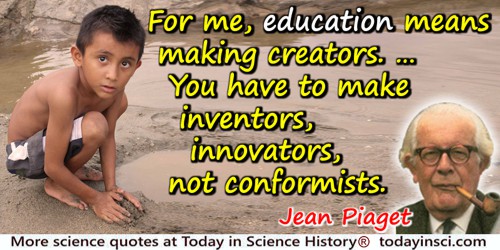

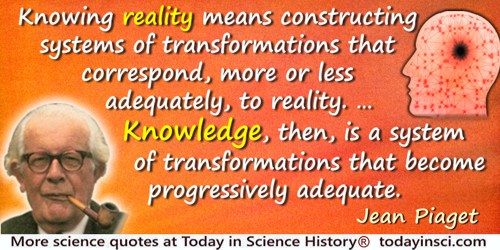

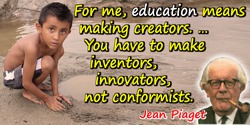
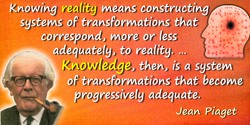

 In science it often happens that scientists say, 'You know that's a really good argument; my position is mistaken,' and then they would actually change their minds and you never hear that old view from them again. They really do it. It doesn't happen as often as it should, because scientists are human and change is sometimes painful. But it happens every day. I cannot recall the last time something like that happened in politics or religion.
(1987) --
In science it often happens that scientists say, 'You know that's a really good argument; my position is mistaken,' and then they would actually change their minds and you never hear that old view from them again. They really do it. It doesn't happen as often as it should, because scientists are human and change is sometimes painful. But it happens every day. I cannot recall the last time something like that happened in politics or religion.
(1987) -- 


